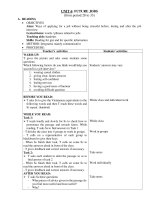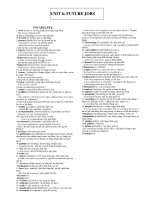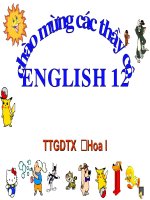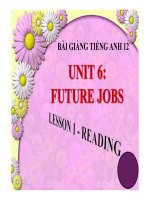Unit 6 FUTURE JOBS e LANGUAGE FOCUS
Bạn đang xem bản rút gọn của tài liệu. Xem và tải ngay bản đầy đủ của tài liệu tại đây (1.98 MB, 41 trang )
h
a b c d e f g
sing a song of abc
come on boys and come on girls
sing a song of abc
a for apple and b for boy
c for cat and d for dog
e for egg and f for fish
g for girl and h for hand
i for ice cream and j for jet
k for kite and l for lamp
m for man and n for nose
o for orange and p for pen
q for queen and r for rain
s for sugar and t for tree
u for umbrella and v for van
w for water and x for x mas
y for yellow and z for zoo
it s so simple all can do
come on boys and come on girls
sing a song of abc
a b c d e f g
sing a song of a b c
come on boys and come girls
sing a song of abc
A for apple and B for boy
h
UNIT 6 : FUTURE JOBS
UNIT 6 : FUTURE JOBS
E: LANGUAGE FOCUS
E: LANGUAGE FOCUS
Friday, November 16
th
, 2012
Weak and strong form of some
conjunctions and prepositions
UNIT 6 : FUTURE JOBS
UNIT 6 : FUTURE JOBS
E: LANGUAGE FOCUS
E: LANGUAGE FOCUS
I. Pronunciation:
1. QUI T C CHUNG :
Dạng phát âm yếu là dạng phát âm thông th ờng của
dạng từ này và chúng chỉ đ ợc phát âm d ới dạng mạnh
trong các tr ờng hợp sau:
+ Khi từ đó xuất hiện ở đầu hoặc cuối câu nói, hay khi
từ đó đ ợc đem t ơng phản với 1 từ khác.
Ex: The letter is from /fr m /, not to /tu:/ him.
+ Khi từ đó đ ợc đánh trọng âm vỡ mục đích nhấn mạnh
của ng ời nói, hay đ ợc trích dẫn.
Ex: she is clever but [b t] lazy
I. Pronunciation:
2. Listen and repeat
Conjunctions
Strong form Weak form
and [ænd] [ənd, ən]
Prepositions
at
for
of
to
from
Strong form
[æt] [ət]
Weak form
but
[bʌt] [bət]
[ɔv]
[fɔ:]
[tu:]
[frɔm]
[fə]
[əv]
[tə]
[frəm]
I. Pronunciation:
What are you looking at?
I want to go, but I don’t know when
She bought a book, and two pens
Thanks for coming
Where is it from?
I want to ask you a question
I’m from Hanoi
The letter was to him, not from him
First of all I want to thank you for coming
She’s the one I’m fond of
3. Practise reading these sentences
1.
2.
3.
4.
5.
6.
7.
8.
9.
10.
Game: Who is faster
spoken
just
to
who herI’ve
sends you
love
Sally,
I’ve just spoken to Sally, who sends you her love.
UNIT 6 : FUTURE JOBS
UNIT 6 : FUTURE JOBS
E: LANGUAGE FOCUS
E: LANGUAGE FOCUS
I. Pronunciation
II. Grammar
1. Presentation 1: Relative Clauses
a) Examples
Ex1: I’ve just spoken to Sally, who sends you her love.
Relative Clauses
Ex2: My classmete is sitting over there. I like her best.
Relative pronoun (S of send)
My classmate, who/whom I like best, is sitting over there.
Relative pronoun (Object of like)
UNIT 6 : FUTURE JOBS
UNIT 6 : FUTURE JOBS
E: LANGUAGE FOCUS
E: LANGUAGE FOCUS
I. Pronunciation
II. Grammar
1. Presentation 1: Relative Clauses
a) Examples
Ex3: The flowers are beautiful. You bought them yesterday.
Ex4: I know the girl. Her father works in this bank.
I know the girl whose father works in this bank.
possessive of father.
The flowers which you bought yesterday are beautiful.
Relative pronoun (Object of bought)
which
which
whose/
of which
ThingPerson
who
Subject
who/whom
Whose
Posses-
sive
Object
UNIT 6 : FUTURE JOBS
UNIT 6 : FUTURE JOBS
E: LANGUAGE FOCUS
E: LANGUAGE FOCUS
II. Grammar
1. Presentation 1: Relative Clauses
b) Notes
Exercise 1:
Add who, whoever, whose, whom or which to
complete the following sentences:
1. I don’t know ______ told you that, but they were wrong.
2. There is one person to _______ I owe more than I can say.
3. It was the kind of accident for _____ nobody was really to
blame.
4. The success of a shared holiday depends on ________ you
share it with.
5. On Sunday _____ was my birthday, we went out for a meal.
6. At 6.00pm, _______ was an hour before the plane was due,
thick fog descended.
7. Mrs Brown was the first owner ________ dog won three
prizes in the same show.
8. Mary was late yesterday, ________ was unusual for her.
9. ___________ leaves last should turn off the lights.
who
whom
which
which
which
which
whose
which
whoever
Exercise 2: Circle the letter of the one under
lined word or phrases that is not correct.
1. A man whose was carrying a lot of money in the box got on the bus.
A B C D
2. Nam is usually lake for school, who makes every one annoyed.
A B C D
3. Most of the people whose were injured in the crash recovered
A B C
quickly.
D
4. Britain imports many cars who were made in Japan.
A B C D
5. The pupils whoever I love very much are playing in the school
A B C D
yard.
6. They appreciate these engineers who contribution is very
important. A B C
D
1. A man whose was carrying a lot of money in the box got on the bus.
A B C D
2. Nam is usually lake for school, who makes every one annoyed.
A B C D
3. Most of the people whose were injured in the crash recovered
A B C
quickly.
D
4. Britain imports many cars who were made in Japan.
A B C D
5. The pupils whoever I love very much are playing in the school
A B C D
yard.
6. They appreciate these engineers who contribution is very
important. A B C
D
GAME : Noughts and
crosses
B
A
948
715
6
2
3
x o x o x o
x o x o x o
o x o x ox
A
B
Circle the letter of the one under lined
word or phrases that is not correct.
- A man whose was carrying a lot of
A B C
money in the box got on the bus.
D
who
- Nam is usually lake for school, who
makes
A B C
every one annoyed.
D
which
Circle the letter of the one under lined
word or phrases that is not correct.
- Most of the people whose were
A B
injured in the crash recovered quickly.
C D
Circle the letter of the one under lined
word or phrases that is not correct.
who
- Britain imports many cars who were
A B C
made in Japan.
D
Circle the letter of the one under lined
word or phrases that is not correct.
which
- The pupils whoever I love very much
A B C
are playing in the school yard.
D
Circle the letter of the one under lined
word or phrases that is not correct.
whom/who
Circle the letter of the one under lined
word or phrases that is not correct.
- They appreciate these engineers who
A B
contribution is very important.
C D
whose
Congratulation!
1. A man who was carrying a lot of money in the box got on the
bus.
3. Most of the people who were injured in the crash recovered
quickly.
4. Britain imports many cars which were made in Japan.
A man carrying a lot of money in the box got on the bus.
Most of the people injured in the crash recovered quickly.
Britain imports many cars made in Japan.
Present participial phrase
Past participial phrase
Past participial phrase
UNIT 6 : FUTURE JOBS
UNIT 6 : FUTURE JOBS
E: LANGUAGE FOCUS
E: LANGUAGE FOCUS
I. Pronunciation
II. Grammar:
2. Presentation 2: Participial phrases
a) Examples:
1. A man who was carrying a lot of money in the box got on the
bus.
3. Most of the people who were injured in the crash recovered
quickly.
4. Britain imports many cars which were made in Japan.
A man carrying a lot of money in the box got on the bus.
Most of the people injured in the crash recovered quickly.
Britain imports many cars made in Japan.
Present participial phrase
Past participial phrase
Past participial phrase
Ex1:
Ex2:









